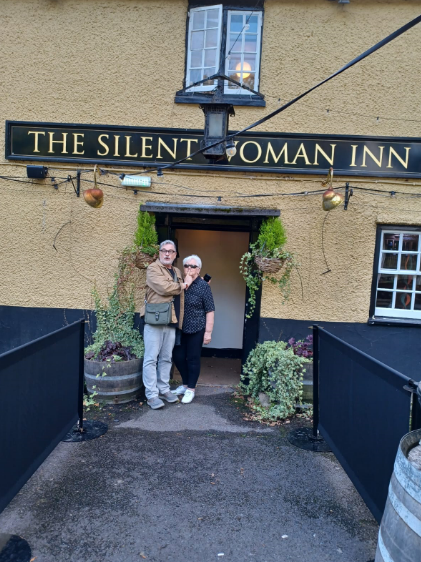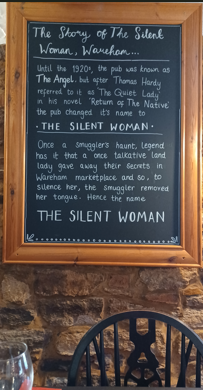
During our recent travel in beautiful England, we frequently stopped at some of the numerous charming, cozy pubs that dot the British countryside.
Whether stopping by for a cup of tea, a pint of ale or for some delicious pub food, the unique pub ambiance made us immediately feel right at home and, often, we felt like we were stepping back in time and observing a part of British heritage.
And indeed, the British pub (a shortened form of public house) is a much treasured and significant part of British culture and history.
In his book, “The English Pub; A Unique Social Phenomenon,” the author, Michael Jackson, calls the English Pub “…an institution unique to England…there is nothing more English…”
One of our frequent stops was a charming pub nestled in the heart of a beautiful, forested area in Dorset, between our home base, the hamlet of Shitterton, and the town of Wareham to the south.
The pub has an interesting name. It is called “The Silent Woman Inn” and a framed sign in the pub (below) tells some of its story.

According to the sign, “Until the 1920s, the pub was known as ‘The Angel,’ but after Thomas Hardy referred to it as the ‘Quiet Lady’ in his novel ‘Return of the Native,’ the pub changed its name to ‘The Silent Woman.’”
And: “Once a smuggler’s haunt, legend has it that once a talkative landlady gave away their secrets in Wareham marketplace and so, to silence her, the smuggler removed her tongue. Hence the name The Silent Woman.’”
While most of the names of British pubs are not as ghastly and certainly not as “silly, crude, funny, odd…” as so many British place names, they can “depict everything from historic events, local folklore and occupations to royalty, notable characters, ancient associations and heraldry,” as we learn in a wonderful September 2017 piece at the History Press.
The article, “A history of British pub names,” takes the reader on a delightful journey down British pubs memory lane, as far back as Roman times, “when Tabernae would hang vine leaves outside as a trading sign, in order to alert passers-by that wine was sold within.”
However, the author suggests, since “when the Romans invaded Britain, vine leaves were in short supply…they hung bushes up outside instead in order to mark out the inns.”
This “gave rise to the many pubs which are now called The Bush, The Hollybush or The Bull & Bush. “
The article continues to trace the history of pub names through the Middle Ages when names such as The Plough, The Copper Kettle, The Boot, and the Blue Door were commonplace.
Then, during the crusades, as “catering for pilgrims and knights on their way to the Crusades in the Holy Land” was important, names such as The Turk’s Head, The Saracen’s Head and The Lamb and Flag became common.
Shortly thereafter, many pub owners decided to have the names of their pubs reflect the product of the their primary trade, ale. Hence The Hop Pole, The Barley Mow or The Three Barrels.
Since then, names honoring British royalty or reflecting heraldry themes have become very popular: The Crown, The White Heart, The Rose and Crown, The Royal Oak (“the third most popular pub name in Britain”), The Kings Head, Kings Arms, and Red, Black, and Golden Lions, in addition to White Horses, White Boars and White Lions.
Interestingly, the article points out, before the Reformation many pub names reflected a religious theme. However, during King Henry VIII’s rule and his Dissolution of the Monasteries, “many pubs were quick to eradicate any Catholic link.” The Ark became The Ship, St Peter became The Crossed Keys. “Other publicans played it even safer by hastily adopting loyal names such as The Kings Head or Kings Arms,” the article adds.
Finally, the article describes how the names of many pubs are associated with:
• The predominant trade or craft in the area such as The Bricklayers’, Masons’, Saddlers’, Blacksmiths’ or Carpenters’ Arms.
• Sporting names such as The Fox & Hounds, Dog & Duck or Hare & Hounds, The Bird in Hand and the extremely popular The Greyhound. We counted four Greyhound Inns in Dorset alone.
• Travel: “As the population became more mobile, a need for coaching inns grew.” Hence: The Coach & Horses, The Wagon & Horses or The Horse & Groom. Today, names such as Navigation Inn, Railway Inn and Stations Inn have become popular.
Then there is The Silent Woman Inn.
















